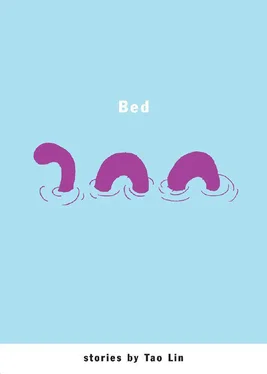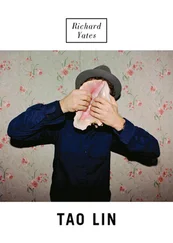Jennika started to say something. She stopped. Her face became a little grotesque, but she didn’t turn to leave. They looked at each other. There was a long silence. That kind of silence that keeps going, that you then resign yourself to — like taking a step, and your foot going down, going further, not touching floor, your face falling, your thoughts going, “The ground, where’s the ground, oh well, oh well …”
They didn’t talk to each other anymore after that.
After work, Brian would spend a lot of time — too much, he suspected — going around looking for a place to eat. It would often take up the entire night, like some kind of wan and moony quest, something shameful and cheaply existential. He would inevitably be unsatisfied, would regret not eating whatever other food — that eluding food of otherness.
In his apartment he would lie on his bed and allow himself some fantasies, which led mostly to masturbation, though it would also lead to list making — to brief, abstract moments when he would understand that he needed simply to do things and then his life would be changed.
Sometimes, unwilling to sleep into the sameness of tomorrow, he would shower and then go out into the night, hoping to fall in love, to be whisked away into that sort of a life. He would buy fey candies, and a sugary drink. When a car came by, he would fear a drive-by shooting or kidnapping. He stayed close to the street-lamps. To discourage hoodlums — there were hoodlums in this neighborhood, it was said — he walked slantly and often turned to cross the street eccentrically.
It was a little thrilling.
Eventually, though, he would become tired and disenchanted. He would go back to his room and feel as if an entire month was inside of him. He would feel big and emptied like that. He would have a stomachache. Nothing was going to happen tonight, or ever. He would shower. Brush his teeth. Lie on his bed, and go into a flat and perished kind of sleep, one in which all his dreams were fraught and blotched and melodramatic and loud, like watching a movie from the front row.
He began to doubt his ability to make friends. He began, as maybe a kind of detachment — or maybe a kind of antisocial sarcasm — to take things literally. What materials did one need in order to make a friend? Was this mostly a DIY thing, or could you pay someone else to do it for you, diligently and in one night, while you slept? He sometimes brought a second mirror into the bathroom and looked at his face from different angles. Was he ugly? How ugly?
He lay in bed, remembering past things from his life.
As a teenager, he made screaming noises at night in his room, like a deranged person. He threw his electrical pencil sharpener at the walls. His mother was downstairs in bed, crying a little, mostly asleep. Brian, in his room, felt as if he might explode, might already — in a slow and miniscule and lingering way — be exploding. He needed to explode. He lay there motionless, but he also lay there exploding. He smooshed his head into his mattress, making sounds like, “aaaghh,” and “ngggg,” and then went downstairs. He stood in the doorway of his mother’s bedroom. He started yelling things. His mother woke, warm and puffy from sleep, and — after Brian finished yelling — whispered that she was sorry for being a bad mother. Her face, ensconced in hair and pillow, was dramatic and friendless as something cocooning. She looked like a little girl, and Brian stood there, taking this in — trying to get at the meaning of things, to fit at once into his mind all the false and watery moments of his life. He stood there, and he looked. He looked some more. And then he went back to his room. He wrote down on paper: “Don’t hurt anyone again.”
But he did. He went on blaming his mother. Yelling at her. About how he couldn’t make friends, how it was because she spoiled him, didn’t ever punish him, didn’t put him into uncomfortable situations, didn’t socialize him, etc.
“Don’t hurt anyone again.”
Brian had a little stack of those papers somewhere.
And, finally, he had, recently, begun to do less of this hurting of other people, this blaming of others, of his mother. Though it was mostly because he did not see anyone anymore. Probably that was the reason.
At work, he stopped saying hi to people, unless they said hi to him first, at which he would then say hi eagerly back and try to smile. But he was not good at smiling. That ataxic struggle of the mouth, it sometimes felt to Brian like a kind of snarling. He could see it on other people’s faces, that he was not smiling, but probably snarling.
After a while, people stopped saying hi to him.
The work atmosphere became foretoken and noir, like a Batman movie.
Most days now Brian didn’t say anything out loud.
He took to sitting in parks. Observing people. Sometimes he would see a girl and a boy holding hands and it would make him happy. “How nice,” he would think. “How nice it is for them.” Though most of the time it just made him jealous. He imagined the couples coming up to him and patting his hair, slapping his cheeks, like a baby. Laughing into his face. He would dare them to.
He bought encrusted nuts from the “Nuts 4 Nuts” people, who were nice people, if a little doomed-seeming.
He made it a point to say thank you and goodbye whenever buying food or other items.
Have a good day. Goodnight.
One day he didn’t go to work.
And then it became so difficult and useless to go to work that he stopped going.
There were moments when you knew for sure that you would never be happy. You thought, “Nothing’s going to happen this year. Ten years, sixty years. That’s right. Of course.” And you felt all those years, there, inside of you, wandering the institutional corridors of your bones, playing ping-pong in the unkempt game-room of your heart, not keeping score, not even using the paddles — but playing stupidly a kind of handball-table hockey. But not even doing that, really. Just standing around. All the years, just standing there. Waiting to happen.
You thought, “Well, then …”
And you imagined being dead. You imagined it might be something like a gasp. A normal gasp, but sustained, and forever — and maybe outside of you, sucking at your air, the suffocation and discomfort increasing without end. The mouth-faced animal of death — flying, taking, wanting always more, like something intelligent and sane, but delinquent and two-years-old. The mouth-headed gliding lung of death. “Of course,” you thought. Because these things were possible. They were. There was even a thing called anti-matter, Brian knew. And black-matter, which was invisible. Eighty to eighty-five percent of all matter was actually black-matter. Brian had read that in a book. There had been an enormous question mark on the opposite page.
For a long time, there was the sensation of life becoming smaller.
Life lost gradually the things of itself. The peripheral items wandered amnesically off, and then flew away, not amnesic at all, just too optimistic and quixotic to stay. You became meeker and less opinionated through all the small maintenances of yourself — the self-aware, mid-day toothbrushing, the splashless handwashing. And the one eye of your soul — the angrysad Cyclops of your soul, with its spiked club, its dark and forsaken cave, its island routine — began to squint, to slowly close.
Life became a puny, disassembling thing.
Something that needn’t be paid any attention to — that you could just leave there.
Brian found that he did not need much to get through each day. Decent Chinese food, a Jean Rhys novel, iced coffee. That was enough for one day. It helped if he stayed in his room and slept more than 14 hours a day, which he did; the peculiar, detached success of being in bed — it was like the padded practice of a thing before the real hurt and triumph of the actual thing.
Читать дальше












